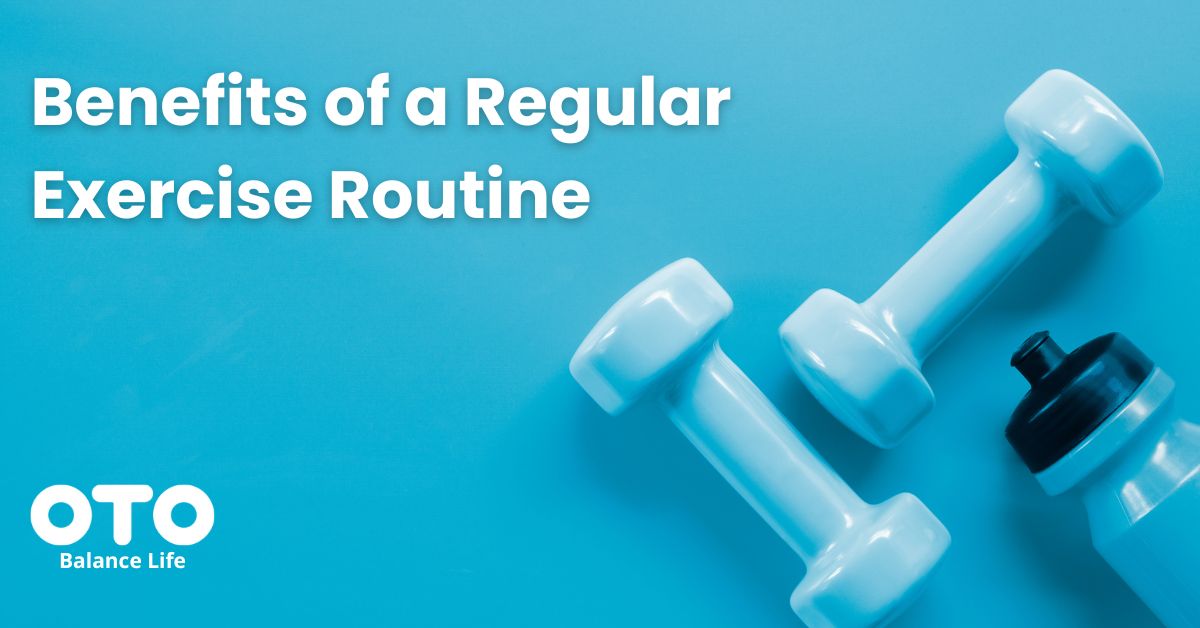Fitness is an essential part of a healthy lifestyle, but with so many demands on our time and attention, it can be difficult to prioritize exercise. However, the benefits of regular exercise are undeniable.
From improving physical health to boosting mental well-being and increasing longevity, a regular exercise routine can have a profound impact on every aspect of our lives.
In this blog post, we’ll explore the many benefits of regular exercise, from increased cardiovascular health and strength to reduced stress and anxiety and improved quality of life.
Whether you’re an athlete or just getting started on your fitness journey, you’ll find something to inspire and motivate you to make exercise a regular part of your routine.
Benefits of a Regular Exercise Routine
Exercise can make you feel happier
Exercise is not just beneficial for our physical health, but it can also have a positive impact on our mental health and well-being. Engaging in regular exercise can lead to increased feelings of happiness and reduce symptoms of anxiety and depression.
Here are some of the ways that exercise can make you feel happier:
A. Reduces stress and anxiety
Exercise can help reduce stress and anxiety by releasing endorphins, which are natural chemicals in the brain that act as painkillers and mood elevators. Regular exercise can help reduce feelings of stress and anxiety, making you feel more relaxed and calm.
B. Boosts self-confidence
Regular exercise can help boost your self-confidence and self-esteem. Achieving fitness goals and improving your physical abilities can give you a sense of accomplishment and help you feel more confident in your abilities.
C. Improves sleep quality
Regular exercise can help improve the quality of your sleep, which is essential for good mental health. By reducing stress and anxiety, exercise can help you fall asleep faster and sleep more soundly, leading to improved mood and mental clarity.
D. Provides a sense of community
Engaging in group fitness activities or sports can provide a sense of community and social support, which can improve your overall sense of well-being and happiness.
By incorporating regular exercise into your routine, you can experience these mental health benefits and improve your overall quality of life. Even small amounts of exercise, such as a daily walk or yoga session, can have a positive impact on your mood and mental health.
Exercise can help with weight loss
Yes, exercise can be an effective tool for weight loss when combined with a healthy diet. By engaging in regular physical activity, you can burn calories and create a calorie deficit, which can lead to weight loss over time. Here are some ways that exercise can help with weight loss:
A. Burns calories
Exercise can help you burn calories, which is essential for weight loss. The number of calories you burn during exercise depends on the type and intensity of the activity, but even low-intensity activities like walking or yoga can help you burn calories and create a calorie deficit.
B. Builds lean muscle mass
Engaging in strength training exercises can help you build lean muscle mass, which can increase your metabolism and help you burn more calories at rest. This can help you achieve weight loss and maintain a healthy weight in the long term.
C. Increases energy expenditure
Regular exercise can increase your overall energy expenditure, which is the amount of energy your body burns throughout the day. By increasing your energy expenditure, you can create a calorie deficit and lose weight.
D. Reduces appetite and cravings
Exercise can help reduce appetite and cravings, making it easier to stick to a healthy eating plan and achieve weight loss goals.
While exercise alone may not lead to significant weight loss, it can be a powerful tool when combined with a healthy diet and lifestyle habits. By incorporating regular exercise into your routine, you can achieve weight loss and improve your overall health and well-being.
Exercise is good for your muscles and bones
Yes, exercise is beneficial for the health of our muscles and bones. Here are some ways that exercise can improve the health of our muscles and bones:
A. Builds and strengthens muscles
Engaging in regular exercise, especially resistance training and weight-bearing exercises, can help build and strengthen our muscles. This can lead to improved muscle mass, strength, and endurance, which can make daily activities easier and reduce the risk of injury.
B. Increases bone density
Weight-bearing exercises can also help increase bone density, which is important for preventing osteoporosis and reducing the risk of fractures. By placing stress on our bones through exercise, we can stimulate the growth of new bone tissue and increase bone density.
C. Improves joint health
Regular exercise can also improve joint health by strengthening the muscles and connective tissues that support our joints. This can reduce the risk of joint pain and injury, and improve mobility and flexibility.
D. Prevents muscle and bone loss with aging
As we age, we naturally experience a loss of muscle mass and bone density, which can lead to weakness, frailty, and an increased risk of falls and fractures. However, regular exercise can help prevent muscle and bone loss with aging and improve overall physical function and mobility.
By incorporating regular exercise into our routine, we can improve the health of our muscles and bones and reduce the risk of injury and chronic conditions. It’s important to choose a variety of exercises that target different muscle groups and incorporate both resistance training and weight-bearing exercises for optimal muscle and bone health.
Exercise can increase your energy levels
Yes, exercise can be an effective way to boost your energy levels and combat fatigue. Here are some ways that exercise can increase your energy levels:
A. Releases endorphins
Exercise releases endorphins, which are natural chemicals in the brain that can improve mood and energy levels. This can help you feel more alert and focused throughout the day.
B. Improves circulation
Engaging in regular physical activity can improve circulation and increase the flow of oxygen and nutrients to the muscles and tissues in your body. This can help you feel more energized and less fatigued.
C. Improves sleep quality
Regular exercise can help improve the quality of your sleep, which is essential for good energy levels. By reducing stress and anxiety, exercise can help you fall asleep faster and sleep more soundly, leading to improved mood and mental clarity during the day.
D. Increases stamina
Regular exercise can help increase your stamina and endurance, which can make daily activities feel easier and less tiring. By improving your physical fitness, you can also reduce the risk of fatigue and exhaustion during physical activity.
E. Reduces stress and anxiety
Exercise can also help reduce stress and anxiety, which can contribute to feelings of fatigue and low energy levels. By reducing stress, exercise can help you feel more relaxed and energized.
By incorporating regular exercise into your routine, you can increase your energy levels and improve your overall quality of life. It’s important to choose activities that you enjoy and that fit into your schedule, as consistency is key when it comes to reaping the benefits of exercise.
Exercise can reduce your risk of chronic disease
Yes, exercise can help reduce the risk of chronic diseases, such as heart disease, diabetes, and cancer. Here are some ways that exercise can benefit your overall health and lower your risk of chronic disease:
A. Improves heart health
Regular exercise can help improve heart health by strengthening the heart muscle, reducing blood pressure, and improving cholesterol levels. This can reduce the risk of heart disease and stroke.
B. Regulates blood sugar
Exercise can also help regulate blood sugar levels by improving insulin sensitivity and reducing insulin resistance. This can lower the risk of developing type 2 diabetes and improve blood sugar control for those who already have diabetes.
C. Reduces inflammation
Chronic inflammation is a contributing factor to many chronic diseases, including heart disease, diabetes, and cancer. Exercise can help reduce inflammation by improving immune function and reducing oxidative stress, which can lower the risk of chronic disease.
D. Improves mental health
Regular exercise can also benefit mental health by reducing stress, anxiety, and depression. This can improve overall well-being and lower the risk of chronic diseases that are linked to poor mental health, such as heart disease and diabetes.
E. Reduces the risk of cancer
Exercise has been linked to a lower risk of certain types of cancer, such as breast and colon cancer. This may be due to its ability to regulate hormones, improve immune function, and reduce inflammation.
By incorporating regular exercise into your routine, you can reduce your risk of chronic disease and improve your overall health and well-being. It’s important to choose activities that you enjoy and that fit into your schedule, as consistency is key when it comes to reaping the health benefits of exercise.
Exercise can help skin health
Yes, exercise can help improve skin health and give you a healthy, glowing complexion. Here are some ways that exercise can benefit your skin:
A. Increases blood flow
Exercise can help increase blood flow to the skin, which can improve circulation and deliver more oxygen and nutrients to the skin cells. This can help promote healthy skin and a radiant complexion.
B. Reduces stress
Stress can have negative effects on skin health, such as causing acne breakouts and wrinkles. Exercise can help reduce stress levels by releasing endorphins, which can improve mood and overall well-being. This can help improve skin health and reduce the appearance of stress-related skin issues.
C. Promotes collagen production
Collagen is a protein that is essential for maintaining the structure and elasticity of the skin. Exercise can help promote collagen production, which can improve skin firmness and elasticity and reduce the appearance of fine lines and wrinkles.
D. Reduces inflammation
Inflammation can contribute to skin issues such as acne and psoriasis. Exercise can help reduce inflammation by improving immune function and reducing oxidative stress, which can benefit overall skin health.
E. Increases sweating
Sweating during exercise can help clear pores of dirt, oil, and other impurities. This can help prevent acne breakouts and other skin issues.
By incorporating regular exercise into your routine, you can improve your skin health and achieve a healthy, glowing complexion. It’s important to choose activities that you enjoy and that fit into your schedule, as consistency is key when it comes to reaping the benefits of exercise for your skin. Additionally, it’s important to protect your skin from the sun by wearing sunscreen and protective clothing during outdoor exercise.
Exercise can help your brain health and memory
Yes, regular exercise has been shown to have a positive impact on brain health and memory. Here are some ways that exercise can benefit your brain:
A. Increases blood flow and oxygen to the brain
Exercise can increase blood flow and oxygen to the brain, which can help improve cognitive function and memory.
B. Promotes the growth of new brain cells
Exercise has been shown to stimulate the growth of new brain cells in the hippocampus, a part of the brain that is important for memory and learning.
C. Improves mood and reduces stress
Regular exercise can help reduce stress and improve mood by releasing endorphins, which can have a positive impact on brain health and memory.
D. Reduces the risk of cognitive decline
Exercise has been shown to reduce the risk of cognitive decline and dementia in older adults. This may be due to its ability to improve blood flow to the brain, promote the growth of new brain cells, and reduce inflammation.
E. Improves sleep quality
Exercise can help improve sleep quality, which is important for brain health and memory. Good sleep can help consolidate memories and improve cognitive function.
By incorporating regular exercise into your routine, you can benefit your brain health and memory. It’s important to choose activities that you enjoy and that fit into your schedule, as consistency is key when it comes to reaping the benefits of exercise for your brain.
Additionally, combining exercise with other brain-boosting activities, such as meditation and social interaction, can further improve brain health and memory.
Exercise can help with relaxation and sleep quality
Yes, regular exercise can help with relaxation and improve sleep quality. Here are some ways that exercise can benefit your relaxation and sleep:
A. Reduces stress and anxiety
Exercise has been shown to reduce stress and anxiety by releasing endorphins, which can help you feel more relaxed and at ease.
B. Promotes relaxation
Certain types of exercise, such as yoga and tai chi, can help promote relaxation by incorporating breathing techniques and mindfulness practices.
C. Improves sleep quality
Exercise can help improve sleep quality by reducing the time it takes to fall asleep, increasing total sleep time, and improving sleep efficiency.
D. Regulates circadian rhythm
Regular exercise can help regulate your body’s circadian rhythm, which can improve sleep quality and help you feel more awake and alert during the day.
E. Reduces the risk of sleep disorders
Exercise has been shown to reduce the risk of sleep disorders, such as sleep apnea and insomnia, by improving sleep quality and promoting relaxation.
By incorporating regular exercise into your routine, you can benefit your relaxation and sleep quality. It’s important to choose activities that you enjoy and that fit into your schedule, as consistency is key when it comes to reaping the benefits of exercise for your relaxation and sleep.
Additionally, it’s important to establish a regular sleep routine and create a sleep-conducive environment, such as keeping your bedroom cool and dark, to further improve sleep quality.
Exercise can reduce pain
Yes, regular exercise has been shown to have a positive impact on reducing pain levels. Here are some ways that exercise can benefit pain reduction:
A. Releases endorphins
Exercise can help release endorphins, which are natural painkillers produced by the body. These endorphins can help reduce pain levels and improve overall well-being.
B. Strengthens muscles and joints
Exercise can help strengthen muscles and joints, which can improve flexibility, reduce stiffness, and alleviate pain associated with conditions such as arthritis and back pain.
C. Improves circulation
Exercise can help improve circulation, which can deliver more oxygen and nutrients to the muscles and joints, promoting healing and reducing pain.
D. Reduces inflammation
Exercise can help reduce inflammation in the body, which can contribute to pain levels. Regular exercise can help reduce inflammation and alleviate pain associated with conditions such as osteoarthritis and fibromyalgia.
E. Improves overall health
Regular exercise can improve overall health and well-being, which can have a positive impact on pain levels. Maintaining a healthy weight, reducing stress, and improving cardiovascular health can all contribute to reducing pain levels.
By incorporating regular exercise into your routine, you can benefit your pain reduction. It’s important to choose activities that are appropriate for your fitness level and that target the areas of the body where you experience pain.
It’s also important to listen to your body and avoid activities that exacerbate your pain levels. Finally, it’s important to consult with your healthcare provider before starting any exercise program, especially if you have a medical condition or are experiencing chronic pain.
Exercise can promote a better sex life
Yes, regular exercise can have a positive impact on your sex life. Here are some ways that exercise can benefit your sexual health:
A. Increases blood flow
Exercise can help increase blood flow to the genitals, which can improve sexual function and arousal.
B. Boosts energy and stamina
Regular exercise can boost energy levels and increase stamina, which can help improve endurance and enhance sexual performance.
C. Reduces stress and anxiety
Exercise has been shown to reduce stress and anxiety, which can help improve sexual function and increase libido.
D. Improves body confidence
Regular exercise can improve body confidence and self-esteem, which can contribute to a more positive body image and improve sexual satisfaction.
E. Releases endorphins
Exercise can help release endorphins, which can enhance mood and increase pleasure during sexual activity.
By incorporating regular exercise into your routine, you can benefit your sexual health. It’s important to choose activities that you enjoy and that fit into your schedule, as consistency is key when it comes to reaping the benefits of exercise for your sex life.
Additionally, maintaining a healthy diet and managing stress levels can further improve sexual function and satisfaction.
In conclusion, a regular exercise routine has numerous benefits for our physical and mental health. From weight loss and stronger muscles and bones, to improved brain health and better sleep quality, exercise can enhance our overall well-being in many ways.
Additionally, exercise can reduce our risk of chronic disease, improve our skin health, and promote relaxation and pain reduction. By incorporating regular exercise into our daily routine, we can improve our physical and mental health, boost our energy levels, and promote a happier, healthier lifestyle.
Remember to choose activities that you enjoy and that fit into your schedule, and to consult with a healthcare provider before starting any exercise program, especially if you have a medical condition or are experiencing chronic pain.
Let exercise be a tool in your health and wellness journey.










Leave a comment